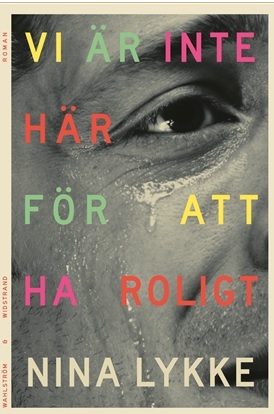NordenBladet – Nina Lykke, a Norwegian writer, has a knack for expecting failure despite consistently achieving success with her books. Her latest novel, “We are not here to have fun,” (Vi är inte här för att ha roligt) continues this trend. Although Lykke doesn’t intentionally aim for humor and the story revolves around a cultured man accused of sexual harassment, the novel has garnered praise.
Lykke expresses gratitude for achieving breakthrough success as a writer after the age of 50. Previously a graphic designer, she experienced literary recognition with her novel “No, a Hundred Times No” in 2016. It sold well, was translated into Swedish and Polish, and earned her a five-year work grant from the Norwegian government.
Surprisingly, her subsequent novel, “Next!,” achieved even greater success a few years later. It was sold in 20 countries and received the prestigious Brage Prize, Norway’s equivalent of the August Prize. However, Lykke maintains her pessimistic mindset and approached her latest work, “We are not here to have fun,” with the belief that it would face complete failure. Contrary to her expectations, the book received positive reviews upon its release in Norway last fall and is now available in Swedish.
Reviewers consistently highlight Lykke’s humor and her ability to dissect and expose various aspects of society, particularly the middle class. Her novels candidly reveal societal truths and challenge preconceptions. In “We are not here to have fun,” she delves into the world of literature and the man of culture. The story engages readers with amusing descriptions while meandering through unexpected paths. Lykke refrains from dividing the world into simple categories of good and bad people, portraying her characters, including the 60-year-old former bestselling author Knut accused of sexual harassment, with their flaws and vulnerabilities.

Lykke explains that she didn’t set out to write a novel solely about the negative aspects of the man of culture. She acknowledges that misunderstandings between men and women often occur, where a minor misstep can be blown out of proportion, generating excessive pity for women. Simultaneously, she emphasizes the importance of men understanding the impact of their actions when it comes to physical contact with women.
Throughout the novel, Lykke skillfully criticizes various phenomena within the cultural world, drawing from her extensive experience as a graphic designer in Norwegian cultural projects for over two decades. Her journey in the cultural hierarchy, from being overlooked to becoming a celebrated author, informs her writing.
Lykke rejects the notion that her work is purely satire. Instead, she believes that the absurdities she portrays in society and the cultural world are not exaggerated but rather reflect the strange behavior prevalent today. She finds humor in observing the peculiarities that surround her, allowing her to craft narratives that strike a balance between reality and fiction.
Aside from exploring class differences, the cultural elite, superficial goodness, and anti-racism, Lykke takes a critical stance against writers who claim to depict reality using real names, akin to Karl Ove Knausgård.
As a Professor Emerita of Gender Studies with a specialization in Gender and Culture at Linköping University, Sweden, Lykke remains actively engaged in research. Her current interests include cancer cultures, critical patienthood studies, geopolitics of cancer, queer widowhood, and postdisciplinary feminist studies.
Nina Lykke’s writing reflects her keen eye for social observations and her ability to find humor in the peculiarities of everyday life. Her unexpected success as a writer continues to defy her own expectations and establishes her as a prominent voice in Norwegian literature.
Feature image: Nina Lykke(YouTube)

